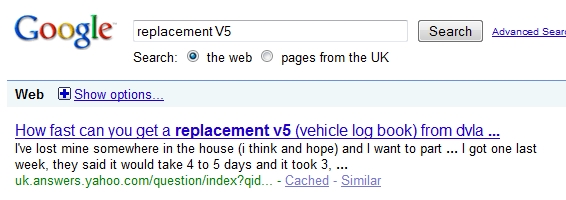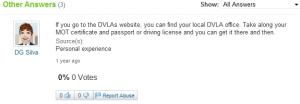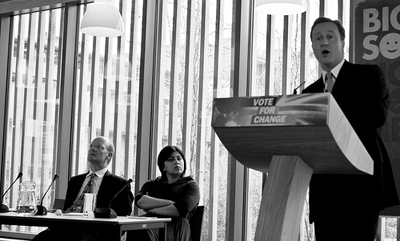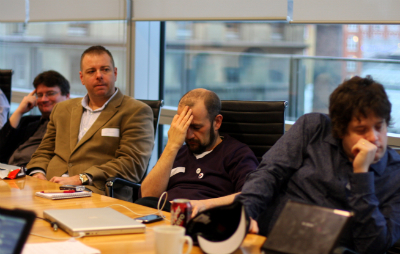I’ve done a lot of work for the Directgov team. I love its core proposition: comprehensive, authoritative, readable information, all there in one place – without bouncing through portals and between different sites, and avoiding confusing journeys through lots of separate brands. But there’s a difference between understanding how it works in theory, and experiencing it…
So when I realised I’d lost a V5 (log book to you) registration certificate for a motorbike I’d just sold which was being picked up the next day… I became a real customer of a real government service.
Firstly, I was very unlucky. No, not just because I’d lost the V5, but because my crisis day happened to be 1 September. New registration day for ’59’ plates. Anniversary of millions of registrations. First working day after a Bank Holiday. First day of the month. It was going to be very busy. Probably as bad as it could be. And I needed that certificate very, very quickly. Great.
So, what happened? First stop: online. And I didn’t go to Directgov. Horror! Me, a convert, as well. Why not? Because I was being normal (sort of). I searched Google for “replacement V5”. Now, a few results down is the Directgov stuff (and DVLA Personalised Registrations – interesting! – well done on optimisation, but not a natural, or indeed useful, place to find out about V5 replacement). But what’s at the top?
Wow!

This! And it emphasises the word ‘fast’! I click through and see a good question, and a seemingly good ‘Best Answer’. Remember, I’m being a real person now, and I am looking for an answer I want to find…
And below the “Best Answer” – even better:

Fantastic! Over the counter. “There and then”. But ‘0 votes’. Hmm. Need to check this. So, now to Directgov to confirm…

Oh. Where’s that over the counter service then? I can see a link to the nearest office; perhaps that’ll tell me. Nope. (And out of interest, when did V5 become V5C – am I in the right place at all here? Perhaps there’s a completely parallel description of the V5 process, including over the counter. Erm. Not that I can find.)
Alright, deadlock and uncertainty online. Time to shift channels. I’m not going all the way to the nearest office in Wimbledon without checking first.
Phone. 90 seconds of messages (I’m paying on an 0870 here – I haven’t used saynoto0870; look here for more on this…) about how I can find what I need online – grrrrr how I hate that – and then: Thank you for calling. Goodbye. Click.
They terminated the call? Not even the chance to hold (at my cost) to be answered? Dear. Oh. Dear. Oh. Dear.
Well – busiest day of the year, I guess…
So it looks like I am now going all the way to Wimbledon without checking first. Thanks to Mr? Silva and his handy “personal experience”. I want to believe it’ll happen. I really do.
Vroom vroom. I get to Wimbledon. Doesn’t look good. Three rows of seating, mostly full. Eight windows, five in operation. A door-greeter though – excellent.
-Hello: quick question – I need a replacement V5. Can I get one issued over the counter here?
-No [Damn!]
-Will it be quicker to get one by queuing here to put in an application, or by using the phone service?
-There isn’t a phone service. You have to apply here or by post. [Oh bloody hell. #fail etc.]
-I think there is a phone service – I saw it on the internet.
-There’s no internet service [sic] – you have to queue here. Take a ticket. [Big smile though. He did care. Noted.]
I took a ticket. Half an hour passed. I listened hard to the greeter. Amazing how many people were coming in just to renew tax discs. TAX DISCS. You don’t even need a DVLA office for that – I wasn’t expecting them to all go online, but I did wonder if they’d ever noticed that Post Offices… I could see quite a few were paying in cash. I almost got out the laptop and dongle to set up my own unofficial direct.gov.uk/taxdisc booth there and then. For cash, naturally. Might I even charge a tiny little mark-up for a faster service? Yes, Brent Council, I did notice…
But that was definitely going to lead towards Making A Public Scene. To an extent that even I was a bit twitchy about ;-)
At the counter (thick security screens):
-Hi – here’s my application form for a replacement V5. Would it have been quicker if I’d done this using the phone service?
-No, it’s exactly the same. If I press my button here it triggers the printing in Swansea just the same as if the call centre do it. [Brilliant – a full, accurate answer! At last!]
-Your chap on the door doesn’t know there IS a call centre.
-Really? Ok, thanks, I’ll tell him [score a point for process improvement]. It’ll print tonight. Takes a week to arrive in the post though. They go Second Class. And there’s strikes and that.
A week. Strikes. Game over. I clutch a till receipt for my £25. That might keep my buyer warm if I show it to him. And grovel.
So what? Why have I written all this (and tweeted most of it at the time)?
Well… You can’t eliminate random, possibly misguided, advice. But you can recognise it, and adapt accordingly. And you can always think of ways to put the customer’s interests first, particularly if you do have a shonky phone service that sometimes can’t take calls…
What if there’d been a few tweaks to the Directgov content? Could these have helped?
1. Near the phone number – “at very busy times we can’t take calls. If this happens, you’ll hear a message straight away when you call us, telling you that your phone call won’t get through. But if you want to stay on the line you will hear some recorded information which may help you”. Needs a tweak to the automated voice system, sure, but you get my point.
2. Catering for the effects of the Mr Silvas of this world. Covering the bases. Add a description of the third way of applying: Apply in person at a DVLA Office. You won’t get your replacement certificate any faster than if you apply by phone. It will still be posted to you, but you will get a receipt for your payment over the counter. This may be useful if you want to show someone that you’ve applied for a new certificate. The receipt isn’t an official motoring document, and you can’t use it when insuring a vehicle, for instance, but it might still be useful to you.
Or going even further: We’ve seen that some advice websites mention that you can get a replacement V5 over the counter at DVLA offices. This isn’t a service that we offer, but we are looking at ways that we might be able to offer it in future. We’ll let you know here if this changes.
And yes, I would have paid the extra 9p for First Class post. Really, I would. C’mon…




